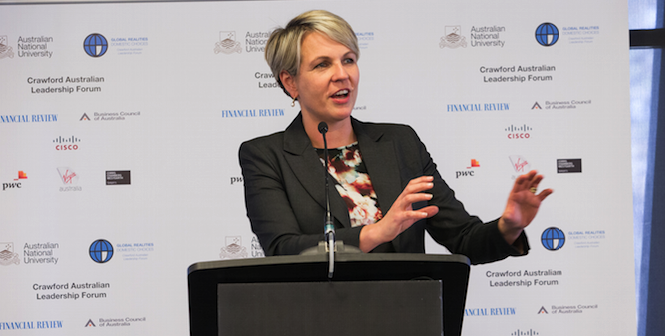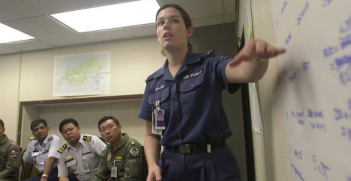Idealism in Foreign Policy: Plibersek and the ALP

Tanya Plibersek, Shadow Minister for Foreign Affairs and International Development, recently said that ‘idealism will always inform Labor’s ongoing goal of building a better world’.
Over the broad course of Australia’s foreign policy history, Australian Labor Party (ALP) foreign ministers have tended to adopt an idealistic view of the world. In the post-World War II era, ALP foreign ministers have shown considerable belief in cooperation between states and institutions, openness and international norms and values. The ALP’s foreign policy has tended to place an emphasis on being an honourable international citizen and helping to create global public goods. As stated by long-serving past foreign minister and AIIA Fellow, Gareth Evans, being a good international citizen provides a nation with reciprocal and reputational benefits. Of course, the intrusion of reality sometimes forces an emphasis on pragmatism in the party room.
Tanya Plibersek and ALP foreign policy
Tanya Plibersek’s address to the National Press Club on 10 February comes in the wake of public outcry over the treatment of asylum seekers, the ongoing conflict and haemorrhaging of refugees in the Middle East, geopolitical tensions in the South China Sea, the global threat of terrorism and devastating climate change. Forging a foreign policy strategy to contend with these issues and the complex social and economic transformations taking place in the Indo-Pacific is not an enviable task.
In recent years, the ALP has chosen to frame its foreign policy stance based on what it describes as the party’s “three pillars of foreign policy”. These pillars are: the US-Australia alliance, Australia’s relationships in the Indo-Pacific and Australia’s multilateral engagement in the world.
US-Australia alliance
The US-Australia alliance continues to underpin Australia’s strategic posture in the region and further afield. In her recent address, Plibersek dubbed ALP leaders as the ‘architects and authors’ of the alliance before criticising Australia’s current role as ‘deputy sheriff’.
Historically, ALP foreign ministers have attempted to maintain the core principles of the alliance while exercising independent Australian diplomacy. During the post-Menzies era, Bill Hayden and Gareth Evans worked effectively to this end. Kevin Rudd loosened Australia’s white-knuckled grip on the alliance after the Howard Government.
In July last year, Plibersek endorsed a further repositioning of alliance rhetoric away from language referring to the Australia-New Zealand-United States Security Treaty as ‘the bedrock of regional stability’. In her recent speech Plibersek noted that Australia ‘cannot rely exclusively on great and powerful friends in a world that has fundamentally changed’.
In 2016 the US-Australia alliance will likely be tested by three major issues: the challenges associated with China’s rise, the enactment of the Trans-Pacific Partnership and the ongoing fight against Islamic State. If the ALP is elected to govern, Plibersek will have to negotiate these issues nimbly while retaining her pragmatic optimism when disagreements with the US inevitably arise.
Relationships in the Indo-Pacific
Greater engagement with Asia – or as Bob Hawke described it ‘enmeshment with Asia’ – has long been a hallmark of the ALP’s foreign policy. The immense economic opportunities available to Australia in the Indo-Pacific continue to be recognised by both major parties. To her credit, Plibersek appears keen to extend beyond the mere transactional nature of economics in order to gain the much-needed respect of Australia’s regional neighbours.
Plibersek’s ambition for the Indo-Pacific appears to be closely aligned with the idealism displayed by Gareth Evans while he held the portfolio. Evans is widely acknowledged for his contribution to the UN peace plan for Cambodia and role in the establishment of APEC and the ASEAN Regional Forum. In her recent address, Plibersek maintained that being ‘a constructive and a considerate member of the Indo-Pacific community is not just the right thing to do,’ but also essential to Australia’s ‘security and prosperity’.
In order for Plibersek to be effective in nurturing relationships in the Indo-Pacific, she should avoid missteps similar to those of Kevin Rudd whose proposal for an “Asia-Pacific community” fell on deaf ears. The aims of his “community” were loosely defined and Asian governments were not consulted before the proposal.
Multilateralism
As a middle power with global interests but limited influence, Australia’s active participation in multilateral fora is considered to be vital by the ALP. According to Plibersek, solutions to ‘problems without passports’ such as pandemics, climate change and terrorism depend on ‘working proactively within the international system’.
Multilateral idealism and activism has been evident in the work of all ALP foreign ministers since Dr Herbert Vere Evatt. Of particular note is the ALP’s work on the creation of the UN and UN Security Council reform, as well as the bid for Australia’s UNSC term in 2013-2014. There has also been work on climate change and whaling, nuclear non-proliferation, peace negotiations and economic, trade and leadership forums and agreements. These successes, and others, were informed by a confident optimism in the merits of the international system.
Plibersek said in her recent speech, ‘if we want to insist that other nations play by the rules, we also need to adhere to them’. Plibersek has announced that an ALP government would attempt to negotiate the maritime boarder between East Timor and submit the matter to international arbitration if negotiations fail. Relations between Australia and East Timor became even more strained in 2013 when Australia was accused of bugging East Timor’s cabinet room.
If the ALP is elected, Plibersek has pledged frank relations with the US, lively and respectful engagement with the Indo-Pacific and optimistic multilateral activism as the pillars of her own brand of foreign policy. Whether or not she would be able to deliver on this remains to be seen. In her address, Plibersek quoted former US Congressman Barney Frank by stating that ‘the opposite of idealism is not pragmatism, the opposite of pragmatism is wishful thinking’. Pragmatic idealism in the name of progress may turn out to be Plibersek’s trademark.
Zenia Anderson is a recent graduate of the Bachelor of International Relations and Bachelor of Journalism at the University of South Australia. She is a past intern at the AIIA National Office and attended Tanya Plibersek’s address at the National Press Club of Australia on 10 February. This article may be republished under a Creative Commons Licence.





